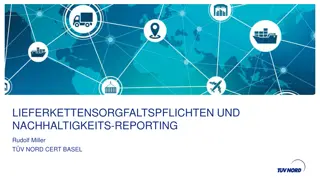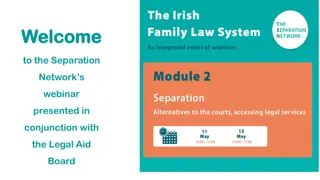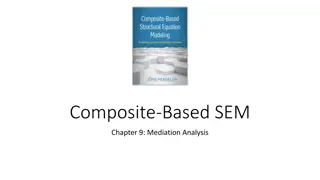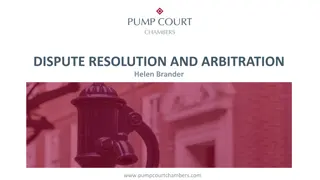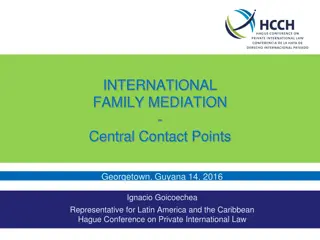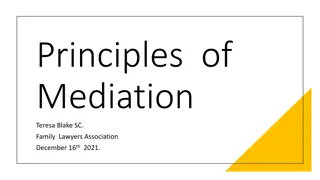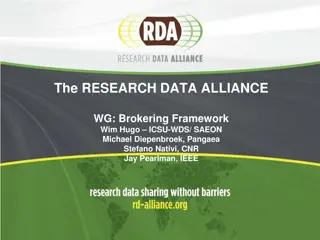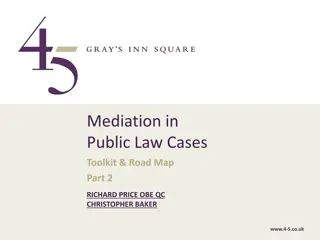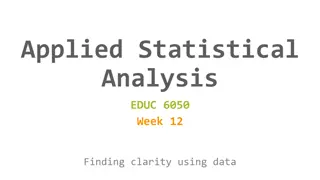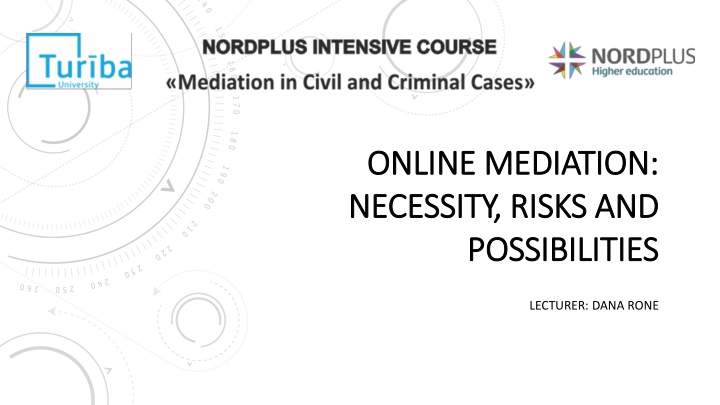
Online Mediation: Necessity, Risks, and Possibilities with Directive 2008/52
Directive 2008/52 highlights the importance of mediation in resolving disputes voluntarily, emphasizing its benefits in civil and commercial matters, especially in cross-border disputes. The Directive promotes the voluntary nature of mediation, allowing parties to control the process while encouraging amicable agreements. Additionally, the role of the Digital Agenda in boosting the EU market post-crisis is discussed, focusing on e-commerce and consumer protection.
Download Presentation

Please find below an Image/Link to download the presentation.
The content on the website is provided AS IS for your information and personal use only. It may not be sold, licensed, or shared on other websites without obtaining consent from the author. If you encounter any issues during the download, it is possible that the publisher has removed the file from their server.
You are allowed to download the files provided on this website for personal or commercial use, subject to the condition that they are used lawfully. All files are the property of their respective owners.
The content on the website is provided AS IS for your information and personal use only. It may not be sold, licensed, or shared on other websites without obtaining consent from the author.
E N D
Presentation Transcript
ONLINE ONLINE MEDIATION: MEDIATION: NECESSITY NECESSITY, RISKS , RISKS AND POSSIBILITIES POSSIBILITIES AND LECTURER: DANA RONE March 13, 2025 1
DIRECTIVE 2008/52 According to EU law (Directive 2008/52), Article 3 (a): mediation is a structured procedure, regardless the name given to this procedure by the domestic legislation, where two or more parties to a dispute try, on a voluntary basis, to reach an agreement with the help and the assistance of a mediator. Compulsory in nature? Who can be mediator? March 13, 2025 2
DIRECTIVE 2008/52. VOLUNTARINESS Preamble. Point 6: Mediation can provide a cost-effective and quick extrajudicial resolution of disputes in civil and commercial matters through processes tailored to the needs of the parties. Agreements resulting from mediation are more likely to be complied with voluntarily and are more likely to preserve an amicable and sustainable relationship between the parties. These benefits become even more pronounced in situations displaying cross-border elements. March 13, 2025 3
DIRECTIVE 2008/52. VOLUNTARINESS Preamble. Point 10: This Directive should apply to processes whereby two or more parties to a cross-border dispute attempt by themselves, on a voluntary basis, to reach an amicable agreement on the settlement of their dispute with the assistance of a mediator. It should apply in civil and commercial matters. However, it should not apply to rights and obligations on which the parties are not free to decide themselves under the relevant applicable law. Such rights and obligations are particularly frequent in family law and employment law. March 13, 2025 4
DIRECTIVE 2008/52. VOLUNTARINESS Preamble. Point 13: The mediation provided for in this Directive should be a voluntary process in the sense that the parties are themselves in charge of the process and may organise it as they wish and terminate it at any time. However, it should be possible under national law for the courts to set time-limits for a mediation process. Moreover, the courts should be able to draw the parties attention to the possibility of mediation whenever this is appropriate. March 13, 2025 5
THE ROLE OF THE DIGITAL AGENDA IN BOOSTING THE EU MARKET Crisis has wiped out years of economic and social progress and exposed structural weaknesses in Europe's economy.[ To] guarantee increasing standards of life for Europeans[ ] the Digital Agenda makes proposals for actions that need to be taken urgently to get Europe on track for smart, sustainable and inclusive growth . Importance of e-commerce. Necessity of consumer protection March 13, 2025 6
LONG-DISTANCE MEDIATION In some States, such as Australia, due to their large geographic territory, long- distance mediation services, by phone, video link or online (also referred to as Online Dispute Resolution ODR), have developed rapidly in the past years Regarding the development of an online family dispute resolution service in Australia see, for example, T. Casey, E. Wilson-Evered and S. Aldridge, The Proof is in the Pudding: The Value of Research in the Establishment of a National Online Family Dispute Resolution Service , 11th Australian Institute of Family Studies conference proceedings. March 13, 2025 7
LONG-DISTANCE MEDIATION Long-distance mediation, however, faces a number of specific challenges, one of which is how to ensure the confidentiality of the mediation session. At the same time, the practical arrangements for the mediation session have to be considered carefully. For example, to avoid any doubts regarding fairness and neutrality of the mediation, it may be helpful, in a case of single mediation, to avoid the mediator joining a video link together with one of the parties (i.e. , in the same room as the party). Regarding the special challenges of long-distance mediation, see the Draft Principles for Good Practice on Dispute Resolution and Information Technology , drawn up by the Australian National Alternative Dispute Resolution Advisory Council (NADRAC), 2002. March 13, 2025 8
LONG-DISTANCE MEDIATION Long-distance mediation might also be of interest for cases where there are allegations of domestic violence and one of the parties indicates that, though wishing to mediate, the prospect of being in the same room with the other party would be very difficult. March 13, 2025 9
CONSUMER PROTECTION From what must consumers be protected from Are European rules of private and procedural international law (Rome I Regulation; Brussels I bis Regulation) enough to ensure protection of contractually weaker parties? March 13, 2025 10
The aim of the new rules in not to ensure access to justice or develop ADR per se, but, rather, to create instruments that are able to offer adequate protection to consumers that, in given circumstances, might lose faith in cross-border e-commerce. Case: breach of contract and the limited amount of the damage for the single consumer does not make economically interesting to seek cross-border redress. Even though in such scenarios the damage is of limited amount for the single consumer, the aggregated enrichment of the business entrepreneur might be exponential, as the damages to the EU e-market are, in so far as mistrust in e- commerce lead a variety of buyers to refrain from online shopping. March 13, 2025 11
COMPETENCES OF THE EU Art. 4 TEU and 169 TFEU The EU shall promote the consumers interests by protecting their health, safety and economic interests, and by improving their access to information, education and self-organisation. March 13, 2025 12
Article 169(1) and point (a) of Article 169(2) of the Treaty on the Functioning of the European Union (TFEU) provide that the Union is to contribute to the attainment of a high level of consumer protection through measures adopted pursuant to Article 114 TFEU. Article 38 of the Charter of Fundamental Rights of the European Union provides that Union policies are to ensure a high level of consumer protection. March 13, 2025 13
In accordance with Article 26(2) TFEU, the internal market is to comprise an area without internal frontiers in which the free movement of goods and services is ensured. The internal market should provide consumers with added value in the form of better quality, greater variety, reasonable prices and high safety standards for goods and services, which should promote a high level of consumer protection March 13, 2025 14
Fragmentation of the internal market is detrimental to competitiveness, growth and job creation within the Union. Eliminating direct and indirect obstacles to the proper functioning of the internal market and improving citizens trust is essential for the completion of the internal market. March 13, 2025 15
Ensuring access to simple, efficient, fast and low-cost ways of resolving domestic and cross-border disputes which arise from sales or service contracts should benefit consumers and therefore boost their confidence in the market. That access should apply to online as well as to offline transactions, and is particularly important when consumers shop across borders. March 13, 2025 16
Alternative dispute resolution (ADR) offers a simple, fast and low-cost out-of-court solution to disputes between consumers and traders. However, ADR is not yet sufficiently and consistently developed across the Union. March 13, 2025 17
ADR has not been correctly established and is not running satisfactorily in all geographical areas or business sectors in the Union. Consumers and traders are still not aware of the existing out-of-court redress mechanisms, with only a small percentage of citizens knowing how to file a complaint with an ADR entity. Where ADR procedures are available, their quality levels vary considerably in the Member States and cross-border disputes are often not handled effectively by ADR entities. March 13, 2025 18
The disparities in ADR coverage, quality and awareness in Member States constitute a barrier to the internal market and are among the reasons why many consumers abstain from shopping across borders and why they lack confidence that potential disputes with traders can be resolved in an easy, fast and inexpensive way. For the same reasons, traders might abstain from selling to consumers in other Member States where there is no sufficient access to high-quality ADR procedures March 13, 2025 19
In order for consumers to exploit fully the potential of the internal market, ADR should be available for all types of domestic and cross- border disputes covered by this Directive, ADR procedures should comply with consistent quality requirements that apply throughout the Union, and consumers and traders should be aware of the existence of such procedures. March 13, 2025 20
The development within the Union of properly functioning ADR is necessary to strengthen consumers confidence in the internal market, including in the area of online commerce, and to fulfil the potential for and opportunities of cross-border and online trade. Such development should build on existing ADR procedures in the Member States and respect their legal traditions. March 13, 2025 21
THE ADR DIRECTIVE 2013/11/EU Preamble, Point 11: Given the increasing importance of online commerce and in particular cross- border trade as a pillar of Union economic activity, a properly functioning ADR infrastructure for consumer disputes and a properly integrated online dispute resolution (ODR) framework for consumer disputes arising from online transactions are necessary in order to achieve the Single Market Act s aim of boosting citizens confidence in the internal market. March 13, 2025 22
THE ADR DIRECTIVE 2013/11/EU Preamble, Point 12: This Directive and Regulation (EU) No 524/2013 of the European Parliament and of the Council of 21 May 2013 on online dispute resolution for consumer disputes are two interlinked and complementary legislative instruments. Regulation (EU) No 524/2013 provides for the establishment of an ODR platform which offers consumers and traders a single point of entry for the out-of-court resolution of online disputes, through ADR entities which are linked to the platform and offer ADR through quality ADR procedures. The availability of quality ADR entities across the Union is thus a precondition for the proper functioning of the ODR platform. March 13, 2025 23
THE ADR DIRECTIVE 2013/11/EU Preamble, Point 40: A properly functioning ADR entity should conclude online and offline dispute resolution proceedings expeditiously within a timeframe of 90 calendar days starting on the date on which the ADR entity has received the complete complaint file including all relevant documentation pertaining to that complaint, and ending on the date on which the outcome of the ADR procedure is made available. The ADR entity which has received a complaint should notify the parties after receiving all the documents necessary to carry out the ADR procedure. In certain exceptional cases of a highly complex nature, including where one of the parties is unable, on justified grounds, to take part in the ADR procedure, ADR entities should be able to extend the timeframe for the purpose of undertaking an examination of the case in question. The parties should be informed of any such extension, and of the expected approximate length of time that will be needed for the conclusion of the dispute. March 13, 2025 24
THE ADR DIRECTIVE 2013/11/EU ARTICLE 5, POINT 2 Member States shall ensure that ADR entities: (a) maintain an up-to-date website which provides the parties with easy access to information concerning the ADR procedure, and which enables consumers to submit a complaint and the requisite supporting documents online; (b) provide the parties, at their request, with the information referred to in point (a) on a durable medium; (c) where applicable, enable the consumer to submit a complaint offline; (d) enable the exchange of information between the parties via electronic means or, if applicable, by post; [...] March 13, 2025 25
THE ADR DIRECTIVE 2013/11/EU ARTICLE 8, POINT A Member States shall ensure that ADR procedures are effective and fulfil the following requirements: A) the ADR procedure is available and easily accessible online and offline to both parties irrespective of where they are [...] March 13, 2025 26
THE ADR DIRECTIVE 2013/11/EU The aim of the directive is to ensure that all consumers have in all EU Member States the right to access ADR schemes, without prejudice to access a court of law, and without prejudice to domestic legislation providing mandatory ADR solution as a condition to seise a court of law. Nonetheless, its scope of application is limited, since only C2B (and not B2C) are covered by the directive. This means, that, save different possible domestic legislations, the rules are not applicable in B2B disputes. Additionally, the reduced scope of application is given by the fact that, should the trader not have its seat in the EU, or should the consumer have his/her habitual residence outside the EU, the directive does not apply (art. 2). Furthermore, the rules that set minimum standards for the quality of the procedure apply only to those ADR centres that require their Member State to qualify them as ADR centre under the directive. The centres that make such request will be subject to public controls (art. 19). March 13, 2025 27
THE ODR REGULATION 524/2013 The purpose of the ODR Regulation is, through the achievement of a high level of consumer protection, to contribute to the proper functioning of the internal market, and in particular of its digital dimension by providing a European ODR platform ( ODR platform ) facilitating the independent, impartial, transparent, effective, fast and fair out-of-court resolution of disputes between consumers and traders online. To this purpose, the regulation seeks to introduce an online entry-point for online dispute resolution. The ODR Regulation only applies to C2B (but also to B2C) disputes related to e-commerce (whilst the directive also applies to offline transactions). The ODR Regulation applies also to pure internally disputes. The Platform should be in all official languages and free of charge (who is going to pay: the EU? The Market? Traders?). http://eur-lex.europa.eu/legal- content/EN/TXT/?qid=1501622701676&uri=CELEX:32013R0524 March 13, 2025 28
ONLINE MEDIATION IN CHILD ABDUCTION CASES Hague Convention of 25 October 1980 on the Civil Aspects of International Child Abduction Guide to Good Practice https://assets.hcch.net/upload/guide28mediation_en.pdf March 13, 2025 29
ONLINE MEDIATION IN CHILD ABDUCTION CASES Article 7 Central Authorities shall co-operate with each other and promote co-operation amongst the competent authorities in their respective States to secure the prompt return of children and to achieve the other objects of this Convention. In particular, either directly or through any intermediary, they shall take all appropriate measures - a) to discover the whereabouts of a child who has been wrongfully removed or retained; b) to prevent further harm to the child or prejudice to interested parties by taking or causing to be taken provisional measures; c) to secure the voluntary return of the child or to bring about an amicable resolution of the issues; d) to exchange, where desirable, information relating to the social background of the child; March 13, 2025 30
ONLINE MEDIATION IN CHILD ABDUCTION CASES Article 7 e) to provide information of a general character as to the law of their State in connection with the application of the Convention; f) to initiate or facilitate the institution of judicial or administrative proceedings with a view to obtaining the return of the child and, in a proper case, to make arrangements for organising or securing the effective exercise of rights of access; g) where the circumstances so require, to provide or facilitate the provision of legal aid and advice, including the participation of legal counsel and advisers; h) to provide such administrative arrangements as may be necessary and appropriate to secure the safe return of the child; i) to keep each other informed with respect to the operation of this Convention and, as far as possible, to eliminate any obstacles to its application. March 13, 2025 31
THE ODR REGULATION 524/2013 Once filled the petition online, the Platform automatically send the petition the ADR centre that has been chosen by the parties (art. 9 (6)). The Platform also offers an electronic case management tool free of charge to conduct the dispute resolution procedure online through the ODR platform itself (art. 5 (4) (d)). The Platform will provide a feedback system which will allow the parties to express their views on the functioning of the ODR platform and on the ADR centre that handled their dispute (but not on the counterparty!). Art. 4 (1) (i) ODR Regulation), the market will exclude bad operators from the market. Online traders established within the Union shall provide on their websites an electronic link to the ODR platform (art. 14 (1)). March 13, 2025 32
THE ODR REGULATION 524/2013 Traders committed or obliged to use ADR to resolve disputes with consumers, shall inform consumers about the existence of the ODR Platform and the possibility of using the ODR Platform for resolving their disputes (art. 14 (2)). Should the parties not agree upon an ADR centre within 30 days after submission of the complaint, the complaint will not be further processed by the Platform. March 13, 2025 33
THE EFFECTIVENESS (?) THE EFFECTIVENESS (?) OF ONLINE ADR UNDER OF ONLINE ADR UNDER THE CURRENT EU LEGAL FRAMEWORK THE CURRENT EU LEGAL FRAMEWORK Practical data on online ADR in general: Out of 379 cases, 25 were settled (a number which is not great, but that is nonetheless double of the mediations that have been rejected by the parties). New rules are indeed likely to boost confidence in online market: However: - think of the mediator/negotiation skills = active emphatic listening is not possible here. Only where the parties are physically present mediators and conciliators, and in general third parties that are supposed to help consumers and traders find an amicable solution, can most effectively investigate the interests of the parties behind their positions. Active and empathetic listening that mediators employ to teach the parties the interests behind their positions is better suited for meeting where the parties are physically present. Where this active and empathic listening is not possible, or is not effective at least for online mediation, the possibility for the impartial third party to help consumers and traders, drops, hence reducing the possibility for them to reach amicable solutions. It thus remains to be seen to what extent these new rules will in practice attain their results. March 13, 2025 34
- the fact that that the Platform will provide a feedback system which will allow the parties to express their views on the functioning of the ODR platform and on the ADR centre which has handled their dispute does not seem, alone taken, enough to strengthen online commerce. Buyers will not always, if they will, check the feedback system provided by the Platform before buying. Should they do so, it has also to be taken into consideration that buyers will not have any information on how the trader has been rated. - issues of financing ADR centres, not taken into consideration by the regulation, who nonetheless imposes neutrality and impartiality of centres. - ADR centres are not automatic negotiation , which would reduce reduces costs. For disputes whose value is not significant, the costs of online mediation could still be higher than the value of the claim. March 13, 2025 35
Thank you! March 13, 2025 36

